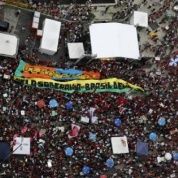The Democratic Charter of the Organization for American States, OAS, has 28 articles and a quick look through them, available on the body’s website, reveals that many governments have been violating them and yet have received no action against them from the organization.

From legal coups to state-complicit enforced disappearances, paramilitary activities to clampdowns on free speech, budgetary malfeasance to organized crime connections, we look at the double-standards within the OAS that seemingly would provoke a similar reaction to the supposed "violations" by the Venezuelan state, yet have provoked no such response.
1. Brazil
In recent months, the new coup-imposed government of Brazil has been one of the major violators of the OAS’s charter, including articles 17,18 and 19 which concern the risks and violations to the democratic political institutional process or its legitimate exercise of power.
Article 19 of the charter states that “unconstitutional interruption of the democratic order or an unconstitutional alteration of the constitutional regime that seriously impairs the democratic order in a member state” could lead the secretary-general to invoke the Democratic Charter and call for an emergency meeting to assess the situation.
Many observers have already called the suspension of President Dilma Rousseff in Brazil and the takeover of power by unelected and corrupt right-wing leaders a legislative coup, which would amount to an unconstitutional alteration of democratic order. However, the OAS has yet to take any action against the new Brazilian government.
The coup in Brazil also violates articles 1,2,3 and 4 which call for the protection of democracy in member states and the protection of the legitimate exercise of power while protecting the population’s right to choose their government.
The new unelected government also violates article 28, which states that member states “shall promote the full and equal participation of women in the political structures of their countries as a fundamental element in the promotion and exercise of a democratic culture.”
The new cabinet is entirely comprised of white males and the trend runs all the way down within ministries and other government officials.
2. Mexico
The Mexican government has been violating articles 4,5,7,9 and 12 in the OAS’s Democratic Character which concern political campaigns, transparency of government and respect for freedom of expression, poverty and human rights, and issues of discrimination and gender equality.
Mexico had, by far, the most complaints at the Inter-American Commission on Human Rights in 2015, according to the body's Executive Secretary Emilio Alvarez Icaza.
In the year 2015, the IACHR received 1,164 complaints from its 35 member states. Of those, 849 involved Mexico – constituting 73 percent of all complaints.
Also, a recent report showed that a highly sophisticated Colombian hacker rigged Mexico’s 2012 presidential elections in favor of Mexican President Enrique Peña Nieto.
Other issues in the country include a crisis of enforced disappearances, state torture, rampant impunity and corruption, alleged connections between politics and organized crime, violence against journalists.
3. Colombia
The Colombian government has also been violating several articles of the OAS’s Democratic Charter, including articles 4,7,9 and 12 which concern transparency and government activities, free speech and human rights as well as poverty and human development.
Colombia has been suffering a major paramilitary insurgency which has been accused of having allies within the government. Paramilitaries regularly shut down communities, carrying out assassinations and killings while intimidating local authorities and residents in locations where they operate.
The government has been accused of turning a blind eye to their activities or at best not doing enough to combat them due to connections within the government.
Several human rights organizations have documented the lack of free speech and self-censorship by journalists and media outlets over fear of a backlash by the government.
Peasants and indigenous groups have been protesting the lack of commitment by the government to advance their rights and protect their communities across the country. The country also suffers from major corruption within security forces, which the government has yet to address.
4. Argentina
The newly-elected government of President Mauricio Macri has been violating several articles of the OAS’s charter, including article 10 which discusses workers’ rights. It states that “the promotion and strengthening of democracy requires the full and effective exercise of workers’ rights and the application of core labor standards.”
More than 154,000 workers have been fired or suspended since Macri took office in December 2015, according to a report by Argentina's Center of Political Economy.
Several major strikes and protests have been taking place since January against the layoffs and destruction of jobs in both the public and private sector.
5. Honduras
Several governments in Central America have been violating the OAS’s Democratic Charter for years. One of the major violators is the Honduran government which came to power after the U.S.-backed coup in 2009.
The current government of Honduras is currently violating at least articles 4,8, and 9 which covers corruption within government and political leadership, human rights violations, protection of Indigenous communities, gender, ethnic and racial discrimination as well as poverty and education.
Several social movement and Indigenous leaders have been victims of assassinations, or assassination attempts, due to their work resisting land grabs by corporations and government institutions.
The latest victim was Berta Caceres, the coordinator and co-founder of the Council of Indigenous Peoples of Honduras, who was killed by unknown assailants inside her home in La Esperanza in the western province of Intibuca.
Human rights groups and activists have blamed the government for her death, claiming that corruption within the government runs all the way to the country’s top prosecutor.